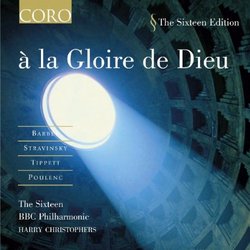The Sixteen, Harry Christophers: Choral Music: To the Glory
Dan Fee | Berkeley, CA USA | 11/06/2009
(5 out of 5 stars)
"The chorus here is led by Harry Christophers, and call themselves The Sixteen. That indicates a small, highly trained choir with sixteen members. Some of the music on this disc was originally released on Collins Classics. The disc starts off with Charles Ives famous and mysterious instrumental piece, The Unanswered Question. Ives meant it to ponder the meaning of life and the cosmos without necessarily giving a pat answer. For Ives the musical journey is the musical destination.
The music is quiet, and the BBC Philharmonic under Harry Christophers play it with involvement and precision. True to Ives' manners, the players do not try to make it smoother and less innovative than the composer's style requires.
Then the chorus a Capella does Samuel Barber's vocal setting of the slow middle movement from his Opus One String Quartet. That middle movement later became one of Barber's most famous and popular classical works, championed by no less a conductor than Arturo Toscanini who premiered the former string quartet movement, now standing on its own as an Adagio, arranged for string orchestra. Later, the composer set this Adagio for voices, unaccompanied. The Barber Adagio is a moving and powerfully evocative piece when played by the massed string orchestra. Transcribing it for voices, adopting the traditional text of the Agnus Dei from the Latin Rite Mass, turns out to be an extraordinary insight, laden with vocal-choral difficulties. In the string version, the gathering harmony and flow of the Adagio is easy to perform on modern strings, which play sustained legato by innate physical nature. Arranged for voices, however, any choir that essays the challenge will find sustaining the musical line and sustaining the shifting-swelling chordal harmonies to be quite a challenge. Singers have to breathe. Managing the choir's breathing without disrupting the music is not all that easily done. (A similar vocal challenge stems from Randall Thompson's famous and difficult setting of the Robert Frost poetry in his Frostiana Suite, especially his setting of the poem, Choose Something Like A Star.)
True to reputation, The Sixteen handle the Barber Adagio faultlessly. Their singing is truly instrumental in pure tonal qualities, and the choir is able to sustain the whole Adagio so that it still comes out, one whole musical piece. This eight and a half minutes of music is a high accomplishment.
Next, this disc offers listeners Igor Stravinsky's venerable Symphony of Psalms, originally commissioned by Serge Koussevitzsky, music director of the Boston Symphony who wanted to further commemorate one of the band's anniversaries. Koussevitzsky was all set to premiere the special commission in Boston in a December concert for the band's 50th; but as it turned out, Ernest Ansermet scooped Koussevitzsky by playing it first in Brussels.
Fav readings of this stunning choral symphony have included the Czech Philharmonic Choir under Karel Ancerl, Simon Preston leading the Choir of Christ Church Oxford, Neeme Jarvi leading Ansermet's long-time band chorus at the L'Orchestre de la Suisse Romande, and the Robert Shaw Singers. Add The Sixteen to my choice list. Their tonal purity and precision make the musical day.
Then we move on to five settings of traditional African American spirituals, abstracted from Sir Michael Tippett's famous modern oratorio, A Child of Our Time. All five are sung, unaccompanied. The choir's handling of this music is full of affection, though a listener who knows genuine down home African American Church gospel style will immediately recognize that Tippett doesn't intend for the singers just to get down in good old religion manner.
The disc wraps up with Poulencs seven Repons des Tenebres, set to texts of Christian Holy Week. This work was commissioned, too, by Leonard Bernstein and the New York Philharmonic who were celebrating their new move to Opening Season in Lincoln Center. Along with Poulenc's famous Gloria and his setting of the Stabat Mater, the Repons may be considered Poulenc's enduring high points in modern religious music. With an April premiere scheduled, the composer delivered the finished music to the publish in January, and died soon afterward.
The Sixteen serves Poulenc with their special blend of uncanny vocal precision and pure tonal color. Their handling of the Latin texts is intelligent and unmannered, just as in Stravinsky's Symphony of Psalms or Barber's Agnus Dei Adagio, both of which involved Latin texts.
Chorus lovers are fortunate indeed, that the Coro label has rescued these out of print Collins Classics readings from the bankruptcy bins. If you want to hear how well your system can handle choral iterations of the human voice, this disc will be test and demonstration material. Beyond that, it is chock full of immensely beautiful and stimulating choral music.
Five stars."


 Track Listings (5) - Disc #1
Track Listings (5) - Disc #1